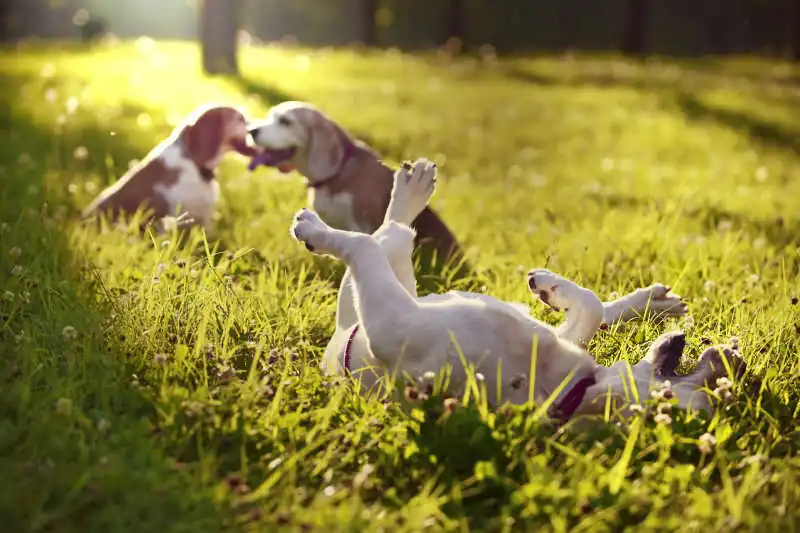What’s wrong with a dog that looks bored and ignores people? Is Dog Depression Possible? What should I do if my dog is depressed?
Just like human beings, dogs have mood changes, sometimes high, sometimes low. Dogs also have joys and sorrows, and sometimes when dogs face major changes in their living environment, or when their owner’s mood is unstable, it is easy for dogs to feel insecure, which in turn can lead to dog depression.
In this article, we take you to understand “7 common symptoms of dog depression”, “4 common causes of dog depression” and “6 ways to relieve dog depression”, so that you can understand more about dog depression, and adjust and relieve symptoms of dog depression. Let’s take a look now!
7 Common Symptoms of Depression in Dogs

1. Loss of interest in many things
Dogs are curious about many things and will want to explore and discover new things. However, the dog who used to love to play games is now not interested in toys, or daily walks, and can’t be motivated, and has lost interest in a lot of things, which is probably a precursor to depression in dogs.
2. Always sleeping
Originally that love to play with the owner of the dog, the game, suddenly become always love to sleep alone, even in the master in the side also can not get excited, a brain in the sleep of the words, we must pay more attention to! Always sleeping baby, may be a precursor to depression in dogs!
3. Always hanging tail
Tail can indicate the dog’s mood, and when the dog is always hanging his tail, you can know the dog’s mood, if you have been hanging his tail to pay attention to the dog is not always low, or always hanging his tail, it may also be a sign of depression in dogs.
4. Eating too much or too little
Depressed dogs may want to eat to face the mood of the unhappy way, so may eat more; but also may be too sad to eat, so eat too much or too little of these two will be reflected in the weight changes, owners can pay more attention to whether there is too much or too little to eat the situation.
5. Restlessness
Some hypochondriacs sleep a lot, but others sleep very little when they are hypochondriacs. If a dog that used to sleep at night has recently started to sleep infrequently or poorly, and has trouble sitting still and falling asleep, think about whether your dog is having psychological problems!
6. Urinating and defecating anywhere
A dog that used to have good habits and then suddenly becomes a pooper, or has a change in habits, can be a precursor to depression. However, it may also be a change in physical disease, so if the dog suddenly starts to urinate and defecate anywhere, it is recommended to bring it to the veterinarian for examination and early detection of the problem!
7. Becoming withdrawn
If the original lively and outgoing dog suddenly becomes reluctant to interact with people or other companions, and always likes to hide and be alone, does not like to socialize with people or other animals, and always retreats, just like the social withdrawal of human beings, it is very likely to be the condition of depression in dogs, and it is recommended that it can be brought to the veterinarian for a diagnosis.
4 Common Causes of Dog Depression

Causes of Dog Depression 1: Physical Disease
Dogs and humans alike, if the body is not comfortable, emotions will also be affected, the dog’s body if there are changes, disease and discomfort and other symptoms, may cause dog depression. Therefore, it is important to pay special attention to the dog’s physical condition whether there is disease or discomfort, which in turn leads to dog depression!
Dog Depression Cause 2: Environmental Changes
Dogs if suddenly from the original familiar environment drastically changed, may cause the dog mood changes, and even the emergence of dog depression, may be: more new members of the family, living environment changes, or moving, weather changes, etc., are likely to cause dog depression.
Causes of Dog Depression 3: Negative emotions
If a dog loses a companion to play with, or loses its owner or family members, negative emotions may occur. Negative emotions include sadness, fear and trepidation, etc. If a dog is in such negative emotions for a long period of time, it may lead to dog depression, so owners should pay special attention to the situation if it occurs.
Causes of Dog Depression 4: Owner’s Emotional Influence
In addition to the dog’s mood, the owner’s mood is also very important, if the owner is in a bad mood, it may also affect the dog’s mood, if the owner is in a bad mood for a long time, it may make the dog’s mood become bad for a long time, which may also cause depression in dogs, therefore, it is necessary to pay special attention to it!
6 Ways to Relieve Depression in Dogs

1. Stable living habits and more exercise
Avoid the possibility of moving or changing the environment of the dog’s activities, try to create a comfortable and stable living environment, so that the dog has enough sleep and good food, can avoid the dog’s tendency to depression yo!
In addition, let the dog more exercise and go out for a walk is also a good way to relieve depression in dogs, in addition to allowing dogs to move their muscles, but also to keep the dog in contact with the outside world and increase the different stimuli to achieve the activation of the autonomic nervous system and the brain!
2. Invite a healing dog to be your companion
The most important thing to consider is to invite a healing dog to be your companion! Exposing your dog to other warm companions can help make him feel less alone. For both humans and animals, socialization is a spiritual need, and having a companion can have a positive impact.
Therefore, you may want to consider inviting a therapy dog to accompany your dog and owner at home to provide unconditional companionship and support, and through this warmth, you may be able to change the psychological condition of the depressed dog, and then help the dog to return to its normal state!
3. Avoid loud scolding or inappropriate physical punishment.
It is important to note that dogs, like humans, can feel changes in their moods, however, loud scolding or inappropriate physical punishment may cause your dog to be in a bad mood. Therefore, when teaching your dog, please try your best not to yell and physically punish him, instead, use patience and gentle education, and use rewards and praises to guide your dog to learn.
4. Spend time with your dog on a regular basis.
The interaction time between dogs and their owners is also very important. For dogs, the time they spend with their owners is a very important part of their lives. Therefore, it is best to spend time with your dog on a regular basis every day. Don’t reduce the amount of time you spend with your dog just because the novelty has worn off, as this may make your dog feel neglected or abandoned.
5. Regular health checkups and assessments
Physical health affects mental health in a very direct and obvious way. If your dog is not feeling well, his mood may be affected, so it is very important to let your dog undergo regular health checkups and evaluations, as veterinarians will be able to understand your baby’s physical condition better and treat it in time.
6. Reward and praise your dog regularly
In addition to this, it is very important to give rewards and praise in your daily life. If you can often give your dog reward snacks, it may help to relieve your dog’s depression, so you can consider giving your dog praise and encouragement frequently!
Here we also recommend a few reward snacks for dogs, including chewy natural snacks and flavorful dairy snacks:
Bite-Resistant Snacks
First of all, chewy treats are a common type of dog treats that are designed to meet your dog’s chewing needs. These treats are usually made of hard ingredients, such as cowhide, bone or duck, that can withstand your dog’s biting and chewing behaviors and are long-lasting.
Designed to stimulate chewing behavior, bite-resistant treats help maintain oral health, reduce anxiety and stress, and promote healthy teeth and gums. These snacks are often used as entertainment and activities for dogs, which can reduce boredom and is a healthy chewing behavior.
When choosing chewable snacks, it is important to make sure they are safe and durable, and avoid choosing snacks that are fragile or potentially dangerous.
Milk & Cheese Snacks
Milk & Cheese snacks are also a popular type of dog treat, usually made from dairy products such as milk or cheese.
These snacks are often considered a tasty reward, as many dogs can’t get enough of their rich flavor. Milk-and-cheese snacks are rich in protein and calcium, which help to maintain your dog’s health and vitality. They can also be used as a training and reward tool to help establish good behavior.
However, some dogs may have sensitivities or allergies to dairy products, so it is important to ensure your dog’s health status and food allergies are taken care of before offering milk cheese snacks. At the same time, it is important to control the amount of snacks to avoid overfeeding which may lead to obesity or other health problems.




